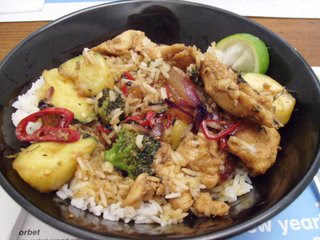 Having just returned from enjoying a delicious lunch at wagamama, I'm now pondering the merits of food outlets providing nutritional information about their dishes. I'm not a calorie counter, rather I try to eat instinctively based on my above-average knowledge of things diet and nutrition related.
Having just returned from enjoying a delicious lunch at wagamama, I'm now pondering the merits of food outlets providing nutritional information about their dishes. I'm not a calorie counter, rather I try to eat instinctively based on my above-average knowledge of things diet and nutrition related.For example, at wagamama I ordered the Spice Chicken Itame. It's chicken breast pieces, stir-fried with broccoli, onion, chilli and zucchini, a host of other flavouring and served with white rice. My rationale for choosing is thus: it contains good quality protein (lean chicken), vegies and a satisfying but not ridiculous serve of carbohyrdates. It's also not creamy and rich like the curried dishes on the menu, oh and it tastes really, really good. Like 'I crave it between visits' good.
Once I'd all but licked the bowl I could see it was lined with an oily residue. This reminded me that although instictive eating can achieve much, unless I prepare a meal myself there is no way of actually knowing what it contains. A colleage of mine once interviewed food critic Matthew Evans (now food columnist at Grazia), who explained that most restaurant food is laced with hidden butter and other fat like duck or goose fat. I bet two thirds of a chef's gruelling apprenticeship is spent learning how to skillfully hide it.
I saw this first hand on Sunday while lunching at the Pasta & Panini bar at David Jones Food Hall. It's a sit-at-the-counter affair, where you watch while the cook finishes off the semi-prepared food in front of you. I was virtually mid 'I'll have the pumpkin risotto...' when I caught another customer's being prepared on the hot plate. My best homecook-estimate puts the butter added at 50g. I ordered spaghetti Bolognese.
Despite these experiences, I don't advocate plastering menus with nutritional information. On my recent trip to the US I had the misfortune of eating McDonald's at LAX. Once I'd polished off my faux-healthy grilled chicken wrap (and er, fries), I spotted the tray mat staring back at me with nutritional info for the entire menu. Not much to good to me after the fact, except to make me feel even more disgusting and guilty about what I had eaten. And I venture that for the fast food frequenters who this is designed to empower, it would do little to deter the next impulsive visit.
At the risk of sounding like a Duggar, the answer is we should prepare more of our own food. If we cooked food for ourselves more often, the occasional meal out doesn't need to be overscrutnised. Apart from being better for the budget and waistline, there are broader arguments about cooking in the home being positive enviromentally, socially and mentally. I'm talking about the financial crisis-induced revolution against consumerism, 80-hour working weeks and the disconnected life. It's about nutritional education, not information.
I'll step back from broader arguments now and return to regular hilarious* programming. So wagamama lunch tasted great, I enjoyed my DJs spag bol despite not knowing about its potential hidden fat and I'll try as much as possible to eat in so I can enjoy these meals on a regular (but not too regular) basis.
*According to a survey of me. And my boyfriend.



